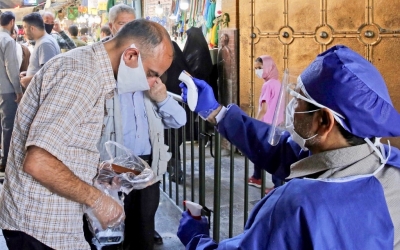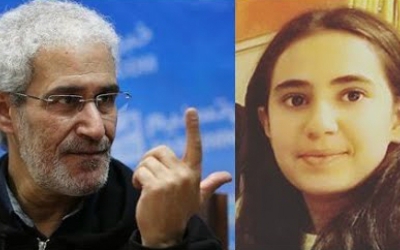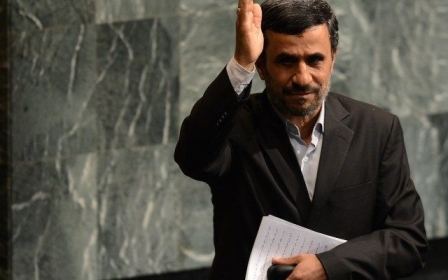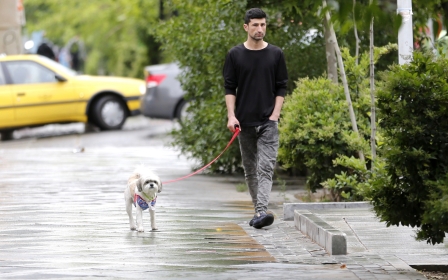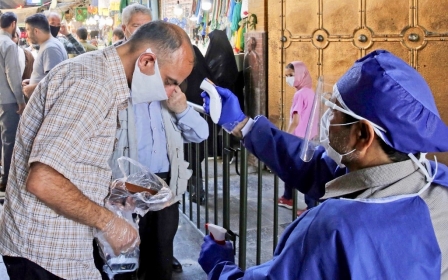Iranian press review: US text messages about election meddling met with derision
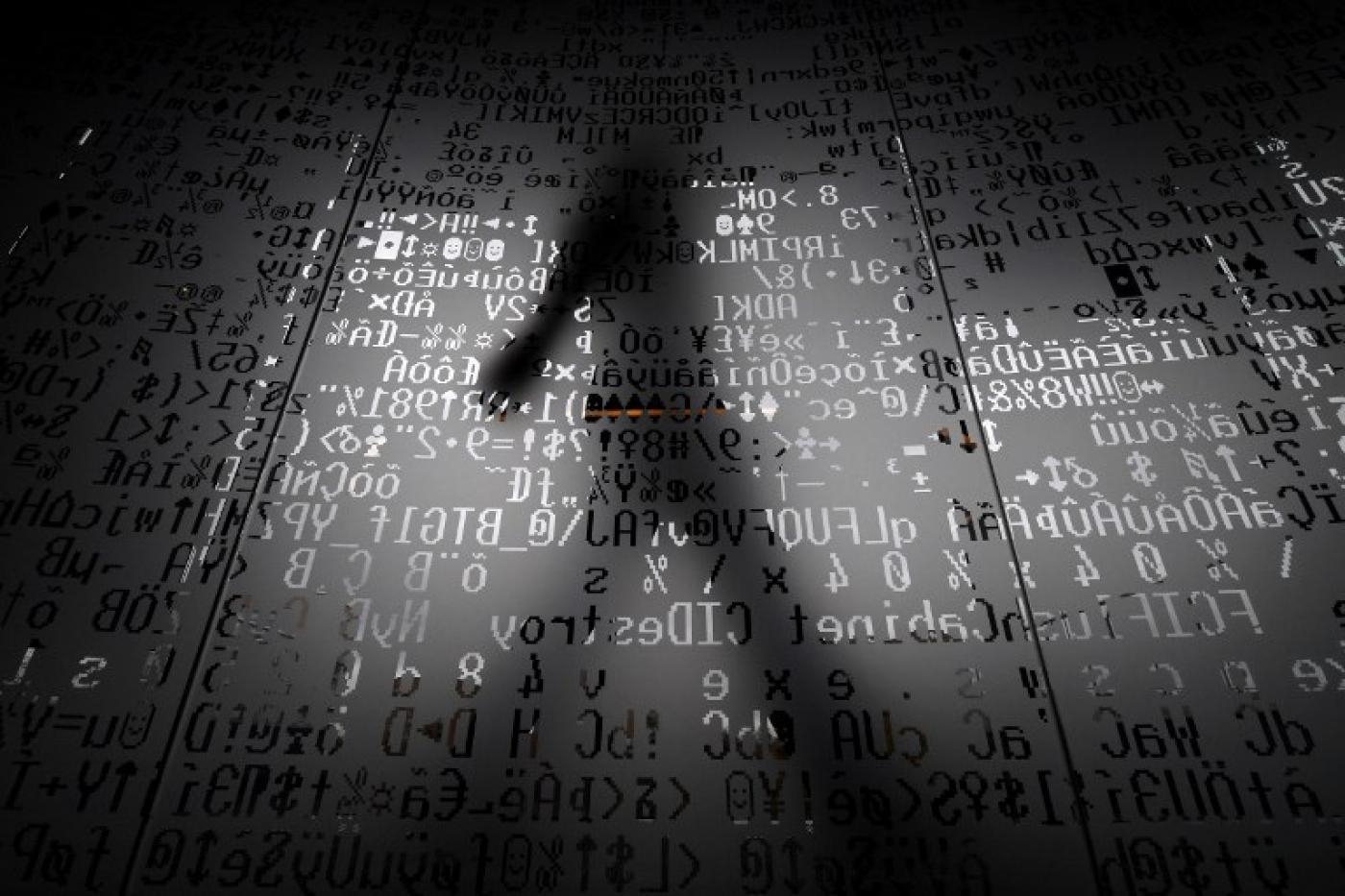
Iranians mock US text messages about election meddling
Text messages randomly sent by the US Department of State to ordinary Iranian citizens offering rewards of up to $10m for any information about foreign governments’ attempts to meddle in the upcoming US elections have triggered sarcasm among Iranians.
Last week, a number of Iranians received the messages in Farsi on their mobile phones saying: “The United States of America pays up to a $10m reward. Reward for information about foreign interference against the US elections,” local media reported.
On 5 August, US Secretary of State Mike Pompeo confirmed that Washington had announced the bounty to thwart criminal cyber activities with the aim of interfering in the US elections.
Iranians have joked about the Farsi message, which had a grammatical mistake, as well as the US cash reward.
“I want to interfere, but I don’t know how I can. Now that I gave you information about myself, would you give me the money?” an Iranian user wrote on Twitter.
Other Iranians joked about how they could receive the reward since Washington has imposed a total embargo on Tehran.
“Where do you deliver the reward? We are not allowed to come to the US and because of the sanctions we can’t have an account in foreign banks. Are you going to deliver the reward to Tehran in a suitcase?” one person wrote.
Meanwhile Tabnak, a website close to Iran’s Expediency Discernment Council - an advisory body for the supreme leader - announced that the text messages were “clear examples of espionage” because the US government “pays money for the information that apparently they don’t have access to”.
Poor Iranians cannot afford facemasks
The coronavirus is quickly spreading in the Iranian capital’s poorer suburbs, where low-income families do not have money to buy facemask, antibacterial gel or alcohol, the Iran newspaper has reported.
According to data released by Iran’s coronavirus control task force, deprived neighbourhoods in the south and southeast outskirts of Tehran have suffered the highest rates of coronavirus cases, hospitalisations and deaths.
Iran has been the hardest hit country in the Middle East from the pandemic, and since the beginning of the outbreak over 19,000 people have died with coronavirus.
Since early July, the country has seen a resurgence of cases with more than 200 daily deaths.
However, BBC Persian has accused the Iranian government of covering up the real numbers, claiming Iran’s death toll from the pandemic could be three times higher than the officially announced numbers.
Meanwhile, local media has reported that many Iranians do not put on facemasks in covered areas and public transport, despite a new nation-wide mask mandate by the government.
The new regulation has caused a 30 percent rise in the price of facemasks in Iran, where different types of masks are now sold for between 100,000 and 700,000 Iranian rials (about $0.50 and $3.30) on the open market, the Donya-e Eqtesad daily wrote.
The Iran newspaper's reporter, who visited some of the poorest neighbourhoods on the outskirts of Tehran, said that hardly anyone in Froun Abad, Mamazand or Quiamdasht wore a facemask.
“A small bottle of alcohol is 150,000 rials. If I had 150,000, I would first buy two skewers of kebab and then would sleep tight without even thinking of coronavirus,” the daily quoted an unnamed 17-year-old youth from Froun Abad as saying.
According to the newspaper, residents on the outskirts of Tehran produce cloth facemasks in unofficial workshops to be sold in other parts of the capital, but none of the workers making them wear a facemask.
“In Froun Abad, facemasks and alcohol are like decorative features for us,” another resident told the daily.
“Here is a poor neighbourhood, and many think ‘let’s die and get rid of this life, better to get out of this rat race'.”
Cities ban women from cycling
An official ban on women cycling in public in several cities in Iran’s northeastern province of Khorasan Raziavi has caused anger among Iranians.
In recent weeks, a provincial branch of the far-right Amre be Marouf organisation has enforced a legal ban preventing women from using bicycles in cities of Sabzevar, Torghabeh and Mashhad.
Since the 1979 revolution, women have been deprived of their rights to cycle in public spaces.
Conservative clerics say that women cycling could be sexually provocative for men. However, moderate and reformist religious leaders believe that no such ban should be imposed.
In May, ILNA news agency reported that the ban had been enforced in the city of Torghabeh.
“[Women] cycling in public is haram [religiously forbidden], and some people want to break [the Islamic norms] by doing so,” Torghabeh prosecutor Hadi Sobhani was quoted by ILNA as saying.
A recent public debate about women cycling started when city officials banned women from cycling in the city of Sabzevar.
In response to the ban, all eight members of the city’s cycling board resigned, local media reported.
The country’s official news agency IRNA also published a video in which it challenged the ban, saying that such provincial orders are against national regulations.
“In the law we don’t have any ban on women’s cycling,” IRNA quoted Masoumeh Ebtekar, Iran's vice president for women and family affairs, as saying.
Meanwhile, Iranians took to social media to voice their opposition to the conservatives’ decisions.
“No matter how hard you try, you can’t prevent women from cycling. You might stop them today, but tomorrow they will be back again,” Marzieh Rasouli, a former political prisoner, wrote on Twitter.
Mostafa Tajzadeh, a deputy interior minister in the administration of former reformist president Mohammad Khatami, criticised the province’s cycling board for not responding to the ban as their colleagues did in Sabzevar.
“Why don't members of Mashahd cycling federation resign like members of Sabzevar cycling board to protest this Taliban-like decision,” he wrote on Twitter.
*The Iranian press review is a digest of reports that are not independently verified as accurate by Middle East Eye.
Middle East Eye delivers independent and unrivalled coverage and analysis of the Middle East, North Africa and beyond. To learn more about republishing this content and the associated fees, please fill out this form. More about MEE can be found here.


